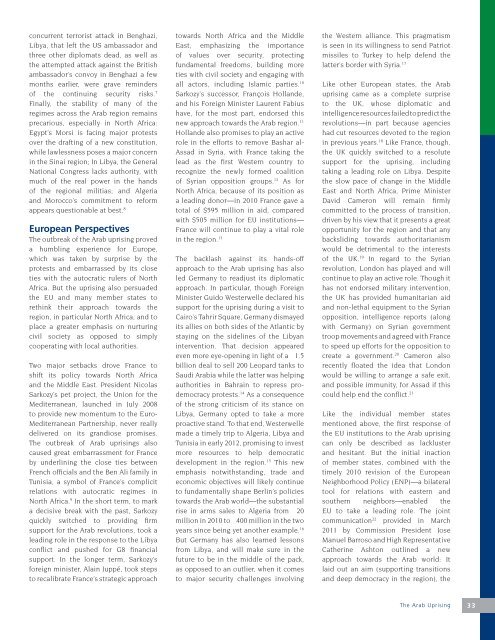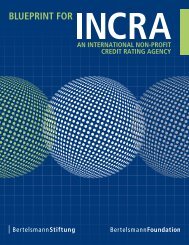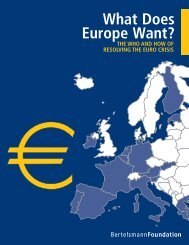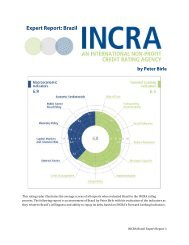BF-FieldManual-FEB13 -3.pdf - Bertelsmann Foundation
BF-FieldManual-FEB13 -3.pdf - Bertelsmann Foundation
BF-FieldManual-FEB13 -3.pdf - Bertelsmann Foundation
- No tags were found...
Create successful ePaper yourself
Turn your PDF publications into a flip-book with our unique Google optimized e-Paper software.
concurrent terrorist attack in Benghazi,Libya, that left the US ambassador andthree other diplomats dead, as well asthe attempted attack against the Britishambassador’s convoy in Benghazi a fewmonths earlier, were grave remindersof the continuing security risks. 7Finally, the stability of many of theregimes across the Arab region remainsprecarious, especially in North Africa:Egypt’s Morsi is facing major protestsover the drafting of a new constitution,while lawlessness poses a major concernin the Sinai region; In Libya, the GeneralNational Congress lacks authority, withmuch of the real power in the handsof the regional militias; and Algeriaand Morocco’s commitment to reformappears questionable at best. 8European PerspectivesThe outbreak of the Arab uprising proveda humbling experience for Europe,which was taken by surprise by theprotests and embarrassed by its closeties with the autocratic rulers of NorthAfrica. But the uprising also persuadedthe EU and many member states torethink their approach towards theregion, in particular North Africa, and toplace a greater emphasis on nurturingcivil society as opposed to simplycooperating with local authorities.Two major setbacks drove France toshift its policy towards North Africaand the Middle East. President NicolasSarkozy’s pet project, the Union for theMediterranean, launched in July 2008to provide new momentum to the Euro-Mediterranean Partnership, never reallydelivered on its grandiose promises.The outbreak of Arab uprisings alsocaused great embarrassment for Franceby underlining the close ties betweenFrench officials and the Ben Ali family inTunisia, a symbol of France’s complicitrelations with autocratic regimes inNorth Africa. 9 In the short term, to marka decisive break with the past, Sarkozyquickly switched to providing firmsupport for the Arab revolutions, took aleading role in the response to the Libyaconflict and pushed for G8 financialsupport. In the longer term, Sarkozy’sforeign minister, Alain Juppé, took stepsto recalibrate France’s strategic approachtowards North Africa and the MiddleEast, emphasizing the importanceof values over security, protectingfundamental freedoms, building moreties with civil society and engaging withall actors, including Islamic parties. 10Sarkozy’s successor, François Hollande,and his Foreign Minister Laurent Fabiushave, for the most part, endorsed thisnew approach towards the Arab region. 11Hollande also promises to play an activerole in the efforts to remove Bashar al-Assad in Syria, with France taking thelead as the first Western country torecognize the newly formed coalitionof Syrian opposition groups. 12 As forNorth Africa, because of its position asa leading donor—in 2010 France gave atotal of $595 million in aid, comparedwith $505 million for EU institutions—France will continue to play a vital rolein the region. 13The backlash against its hands-offapproach to the Arab uprising has alsoled Germany to readjust its diplomaticapproach. In particular, though ForeignMinister Guido Westerwelle declared hissupport for the uprising during a visit toCairo’s Tahrir Square, Germany dismayedits allies on both sides of the Atlantic bystaying on the sidelines of the Libyanintervention. That decision appearedeven more eye-opening in light of a €1.5billion deal to sell 200 Leopard tanks toSaudi Arabia while the latter was helpingauthorities in Bahrain to repress prodemocracyprotests. 14 As a consequenceof the strong criticism of its stance onLibya, Germany opted to take a moreproactive stand. To that end, Westerwellemade a timely trip to Algeria, Libya andTunisia in early 2012, promising to investmore resources to help democraticdevelopment in the region. 15 This newemphasis notwithstanding, trade andeconomic objectives will likely continueto fundamentally shape Berlin’s policiestowards the Arab world—the substantialrise in arms sales to Algeria from €20million in 2010 to €400 million in the twoyears since being yet another example. 16But Germany has also learned lessonsfrom Libya, and will make sure in thefuture to be in the middle of the pack,as opposed to an outlier, when it comesto major security challenges involvingthe Western alliance. This pragmatismis seen in its willingness to send Patriotmissiles to Turkey to help defend thelatter’s border with Syria. 17Like other European states, the Arabuprising came as a complete surpriseto the UK, whose diplomatic andintelligence resources failed to predict therevolutions—in part because agencieshad cut resources devoted to the regionin previous years. 18 Like France, though,the UK quickly switched to a resolutesupport for the uprising, includingtaking a leading role on Libya. Despitethe slow pace of change in the MiddleEast and North Africa, Prime MinisterDavid Cameron will remain firmlycommitted to the process of transition,driven by his view that it presents a greatopportunity for the region and that anybacksliding towards authoritarianismwould be detrimental to the interestsof the UK. 19 In regard to the Syrianrevolution, London has played and willcontinue to play an active role. Though ithas not endorsed military intervention,the UK has provided humanitarian aidand non-lethal equipment to the Syrianopposition, intelligence reports (alongwith Germany) on Syrian governmenttroop movements and agreed with Franceto speed up efforts for the opposition tocreate a government. 20 Cameron alsorecently floated the idea that Londonwould be willing to arrange a safe exit,and possible immunity, for Assad if thiscould help end the conflict. 21Like the individual member statesmentioned above, the first response ofthe EU institutions to the Arab uprisingcan only be described as lacklusterand hesitant. But the initial inactionof member states, combined with thetimely 2010 revision of the EuropeanNeighborhood Policy (ENP)—a bilateraltool for relations with eastern andsouthern neighbors—enabled theEU to take a leading role. The jointcommunication 22 provided in March2011 by Commission President JoseManuel Barroso and High RepresentativeCatherine Ashton outlined a newapproach towards the Arab world: Itlaid out an aim (supporting transitionsand deep democracy in the region), theThe Arab Uprising3 3






